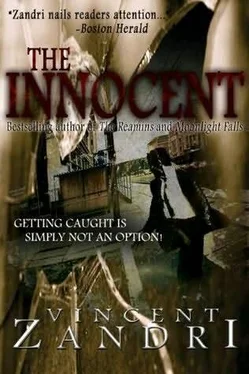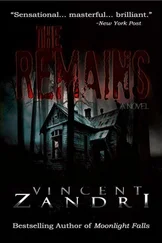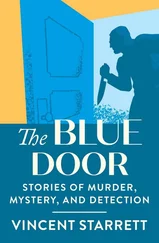I sat on the floor of the fifty-year-old cabin, but for some reason, I did not feel the floor beneath me. Beside me, Cassandra slept soundly. The tattoo on her neck rose and fell with the rhythm of her silent breathing. I had to trust her, whether I liked it or not. At least, I had to believe I could trust her. Together we were on the run. Like me, she had been accused of the murder of Eduard Vasquez. I had to believe she was innocent, because what would she have gained by killing him?
To be honest, she had a lot to gain.
She had three hundred thousand dollars cash to gain and a videotape she could use to blackmail Pelton for even more money. Still, I had to go with instinct, and my instinct told me she was innocent. After all, if she had killed Vasquez and managed to elude the police, why would she have come this far with me?
I believed this: that Cassandra Wolf had not shot Vasquez. The trigger man had to have been Pelton or Schillinger, or both. Or more likely, it had been Tommy Walsh acting on Pelton’s orders, or maybe even the overcoat man.
Cassandra slept soundly, breathing steadily, like a baby. She was no baby, though. She was a grown woman on the run. And I needed her more than anything else in the world. I would guard her with my life. Maybe protection was her reason for staying with me. But then, maybe protection had nothing to do with it at all.
THE NEXT MORNING I parked the Pontiac in an observation area overlooking the Champlain valley to the south. Getting out of the car, I cut through the second-growth woods at a jog until I sighted the blinking red stop light that hung over the place where Exit 28 met the Champlain road. From within a small patch of pines and birch trees located beside a garage used to house snowplows and dump trucks for the Champlain Valley Department of Transportation, I waited for Val’s Town & Country station wagon to pull up.
At exactly one minute before nine A.M., the car rolled to a stop off the exit. I watched Val look one way along the Champlain road, then the other. Until she hooked a right, keeping her speed as slow as possible. The closer she came to the garage, the easier it was to see her lovely sandy-brown hair and her deep, almond-shaped eyes, and the more I felt my lungs deflate, my heart swell. She drove slowly, twisting and turning her head, surveying the open road, until she finally decided to pull the wagon over to the shoulder, not ten feet away from the asphalt drive that led up to the metal doors of the DOT garage.
I walked out of the woods and made my way downhill to the car. I opened the passenger-side door of the wagon, slipped inside, and smelled the good, sweet smell of Val. I wanted to take her in my arms and kiss her and hold her, swallow her. But I knew there was no time for that.
“Drive,” was all I said.
I told Val to make a right-hand turn into the observation area.
“I have everything,” she said.
“I knew you would,” I said.
The observation area had been built along a natural clearing in the mountainside. The clearing looked out onto a view of the southern portion of the Champlain valley, where it abutted the northern portion of Lake George. The observation area itself was nothing more than a concrete sidewalk and a short, knee-high wall made from fieldstones topped with polished slate.
I got out of the car and unlocked the trunk to the Pontiac.
Val opened the hatch of the wagon.
Without a word, we made the exchange of clothes, food, and weapons. Val tried not to show that she was nervous. She kept a straight, tight face the whole time, never once smiling or, for that matter, submitting to a frown. Her face was flat and expressionless, her motions direct and to the point. When the exchange was over, the two of us got into the car.
She wore dark slacks, a white, button-down shirt, and a blazer. Her shirt was unbuttoned at the collar and a gold crucifix hung from a gold chain against the smooth bronze-colored skin of her chest. But now I could tell by the sudden downtrodden expression on her face that something wasn’t right. Something besides the obvious. She wouldn’t look at me directly. When I tried to catch her glance, she looked away and pinched the underside of her chin like she somehow forgot it was attached to her face.
“Val,” I said, grabbing her elbow. “What’s wrong?”
Looking down at the floor of the station wagon she started to cry. She reached behind the seat and picked up a copy of the morning’s Times Union. She laid the newspaper in my lap, headline staring at me.
APD Officer Found Hanged!
I folded the newspaper in half and slammed it against the dash of the wagon. The impact was like a blast from a.45 and just as shocking. Val jumped and emptied her lungs of oxygen. I let the paper fall to the floor, sat back in the seat, and drew a deep breath.
“I’m sorry,” I said.
“I know,” she said. “So am I.”
I took her in my arms and held her, and she held me.
“Do you really believe Mike could have killed himself, Keeper?”
“What I think is that Pelton could have made it look like a suicide.”
Now that we had calmed down, I was holding Val’s hand and giving her the play-by-play behind the Vasquez-Pelton drug operation. I relayed exactly what Cassandra had told me just hours before, without altering a single detail of her story.
“It’s true,” I said. “Mike turned the evidence I found at the gravel pit over to Pelton. But he must have done it out of desperation, for the promise of money.”
“In turn,” Val said, “Pelton may have considered him a security risk. I mean, the last thing Pelton needed was for Mike to get drunk and shoot his mouth off.”
“Wouldn’t take much to make Mike look suicidal. I know how you felt about him, Val, but we both know he was a hopeless boozer, and we both know that the department had continually passed him by, right? Attica was a long time ago but the scars stay with you forever and there’s no way in hell they were about to let him forget about his breakdown.”
“But my God, Keeper,” Val said, squeezing my hand hard, “that was so long ago.”
“So long ago but not long enough. When you saw what we saw during those four days, twenty-five years may as well be twenty-five seconds.” I stopped there, but I wanted to go on. I wanted to tell Val that you never forgot the smell of the dirt or the look of the rain when it fell in sheets into puddles filled with the blood from a man who’s been castrated, or a man who’s had his skull pounded in with an iron bar. It never leaves you, I wanted to tell her. There wasn’t a single day at Green Haven that I didn’t think about it. I never pretended for even a second that Attica couldn’t happen again, because it would. And when it did, it was going to be worse, and more officers and inmates and civilians were going to die, but they wouldn’t die easily. I wanted to tell her all this. But I let it go.
Val pulled her hand away and used the other to rub the feeling back into it.
“I’m sorry,” she said.
I drew in a deep breath.
“I’m the one who’s sorry,” I said. “It’s just that those feelings are so ingrained and I never talk to people about Attica, except to myself.”
For a minute or two we said nothing. Then I said, “I just can’t help but think that Pelton had Mike killed.”
“To Wash Pelton,” Val said, “Mike’s failings must have seemed like an opportunity.”
Below the article about Mike’s suicide was a smaller headline.
Warden and Cop-Killer’s Girlfriend, Fugitives!
Planted below the headline was the face of the pastor whose car I’d stolen. A small caption beneath it read, “I asked them to place their trust and forgiveness in the Lord.” Below that, another headline advertised,
Читать дальше












